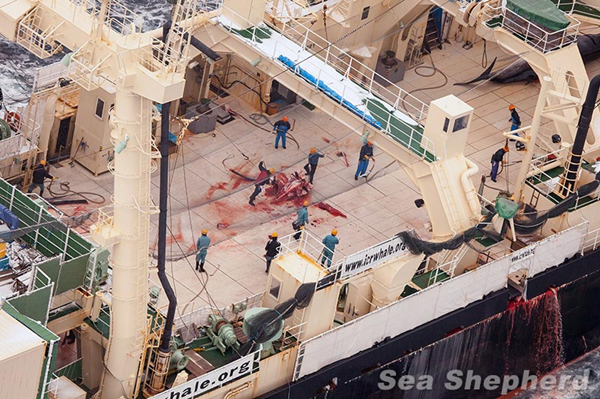UN court ruling reaffirms protection of S. Ocean whales
 0 Comment(s)
0 Comment(s) Print
Print E-mail China.org.cn, April 1, 2014
E-mail China.org.cn, April 1, 2014
The International Court of Justice ruled yesterday that Japan should immediately cease all whaling activities under its current scientific program JARPA II. The decision is a major victory for whale protection efforts and a clear call for the end of hunting in the Southern Ocean.
 |
|
Blood runs from the scuppers of the Japanese whaling fleet Nisshin Maru with the severed head of a Minke Whale, and a poached Minke awaiting butchering. The photo was taken in the Southern Ocean Whale Sanctuary and released by Sea Shepherd on January 5, 2014. |
The judgment in favor of Australia in the case against what Japan calls 'scientific whaling' came in a near unanimous ruling announced by the UN's highest court. The ruling upholds Australia's claim that Japanese whaling under its JARPA II program is in breach of its obligations under the International Convention for the Regulation of Whaling.
"This is a true victory for whale conservation," said Leigh Henry, senior policy advisor for wildlife conservation at World Wildlife Fund (WWF). "Today's ruling from the International Court of Justice finally puts an end to over three decades of whaling in the Southern Ocean Sanctuary, a critical feeding ground for many of the world's whales."
"We hope that tomorrow will bring a similar triumph for whales when President Obama decides if the US will hold Iceland accountable for its illegal commercial whaling activities," said Henry.
In the ruling, the court determined that Japan's program was not designed to reach its stated objectives and that the special permits granted by Japan in connection to its whaling in the Southern Ocean are not for scientific research.
"Japan shall revoke any extant authorization, permit or license granted in relation to JARPA II, and refrain from granting any further permits in pursuance of that program," said Judge Peter Tomka in reading the decision.
As a result of the ruling, the Japanese government must end all whaling under their current program in the Southern Ocean. The court's decision is binding and cannot be appealed.
The Australian government initiated legal proceedings against Japan in 2010. The case alleged that scientific whaling by Japan is a violation of the country's treaty obligations under the International Convention for the Regulation of Whaling as well as other international obligations for the preservation of marine mammals and the marine environment.
Commercial whaling was banned worldwide in 1986. The Southern Ocean surrounding Antarctica was declared a whale sanctuary eight years later. Despite these protections, Japan has hunted over 10,000 whales in the Southern Ocean since the moratorium was put in place.
"Today we celebrate this decision, which is as much a win for whale conservation as it is for the enforcement of international agreements that protect wildlife for generations to come," added Henry.
In addition to whaling, Southern Ocean whales are under threat by commercial fishing of prey species, noise pollution, chemical spills, ship strikes, and climate change. The uncertainty around Southern Ocean whale population numbers increases the importance of a precautionary approach to their management.






Go to Forum >>0 Comment(s)